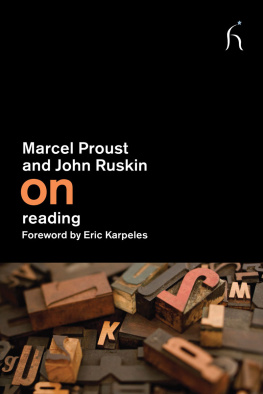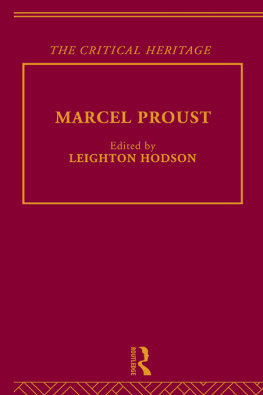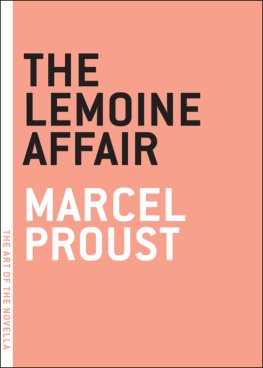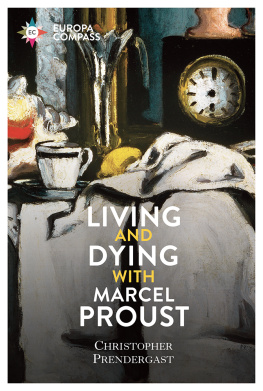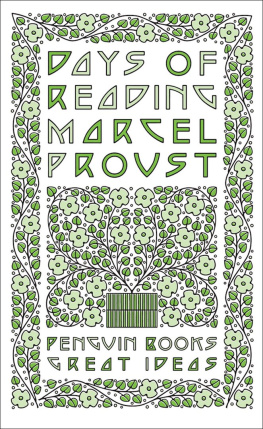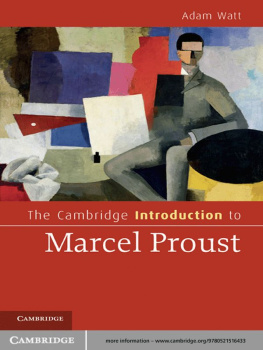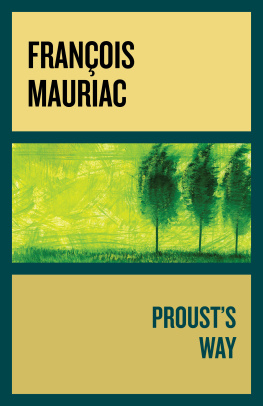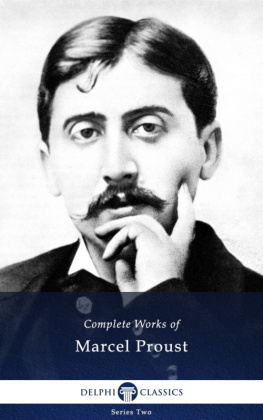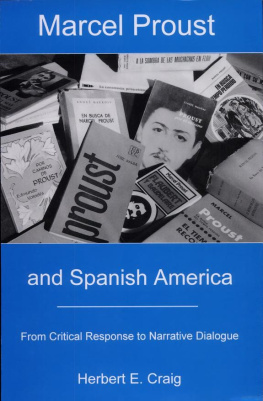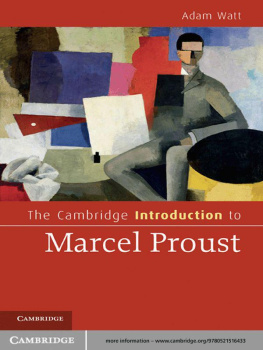on
Published by Hesperus Press Limited
19 Bulstrode Street, London WIU 2 JN
www.hesperuspress.com
Of Kings Treasuries from John Ruskins Sesame and Lilies, first published 1865
Selections from Prousts translators preface to Ruskins The Bible of Amiens, first published 1904
Prousts translation, notes, and preface On Reading, first published 1906
This collection first published by Hesperus Press Limited, 2011
Introduction and translation Damion Searls, 2011
Foreword Eric Karpeles, 2011
Designed and typeset by Fraser Muggeridge studio
Printed in the UK by CPI Mackays, Chatham
ISBN : 978-1-84391-616-1
All rights reserved. This book is sold subject to the condition that it shall not be resold, lent, hired out or otherwise circulated without the express prior consent of the publisher.
Contents
Foreword
Between the writing of Jean Santeuil and A la recherche du temps perdu, Marcel Proust committed many years to his translations of Ruskin and their accompanying notes and forewords. Ruskins voice was engaging, personal and accessible: May I ask you to consider with me what this idea practically includes? the eminent Victorian inquired politely about the concept of ones having a position in life. Proust, whose gift as a translator came not from language skills but rather from a profound comprehension of his subject, struggled to make Ruskins English come alive in French. What we have in Damion Searlss present selection of Prousts prefaces to Ruskin is an almost Wildean farce of accumulated attributions: I am writing a foreword to his translation of Prousts introductions to his own translations of Ruskin. (Im sure the programme will be delightful, after a few expurgations, as Lady Bracknell says.)
In a volume called Sesame and Lilies, evoking the masculine and feminine, the foremost English cultural critic of his time collected a series of lectures he had given on the opposing natures of man and woman. In these talks, Ruskin expounded upon the virtue of books and the importance of reading as an edifying activity. If you do not know the Greek alphabet, learn it, John Ruskin pleaded to his audience, associating classical values and arts moral imperatives. To discriminate between lighter fare newspapers, fiction, travel diaries - and more substantive literary endeavors, he made the claim that a book is essentially not a talking thing, but a written thing.
As I made my way through this selection, I was struck otherwise. Of Kings Treasuries from Sesame and Lilies seemed to me to be very much a talking thing indeed; how intensely aural the experience of reading it proved to be. The resounding voices of Proust and Ruskin can be heard as well as read in these pages. And by juxtaposing the English philosopher with his French disciple, Searls affords us the rare privilege of overhearing Prousts mind engage with Ruskin in what is tantamount to spoken dialogue. From across the divide of 100 years, we hear Proust vocalise clearly and directly: Need I add that if I describe this taste, this kind of fetishistic reverence for books as unhealthy and pernicious, it is only relative to the ideal habits of a spirit altogether lacking in faults, one which does not exist; I do so like the physiologists who describe as an organs normal function something which is hardly ever found in living beings. In these pages the writer is not hiding behind a scrim of narrative fiction, so our connection to his verbose, complex sensibility feels more immediate, more revealing. Here we find fully realised the voice first developed in Les plaisirs et les jours, later to be fructified in Contre Sainte-Beuve.
According to Ruskin a book may not be essentially a talking thing, yet he put forth the proposition that reading is a conversation. Proust, however, maintained that reading cannot be equated to conversation, insisting that one reads only in a condition of solitude. Meanwhile, reading these comments, I felt he was speaking within earshot, as if I overheard him speaking at a caf table next to mine. Despite his insistence upon the necessity of solitude, Proust developed an engaging writing style that is decidedly conversational, nearly chatty. And his voice is not the only one we hear. Proust calls forth other voices in these pages, cuing entries at precise moments from Matthew Arnold, Anatole France, Emerson, Racine, John Stuart Mill, George Eliot, Shakespeare. Passages from the highly colloquial King James Bible are inserted. Proust is like a literary choirmaster, and resembles the humble pianist who sits down to play for Mme Verdurin, causing her to exclaim, je crois entendre un orchestre.
Much as Proust absorbed Pellas while tuning in his Thtrophone broadcast, we too, reading these texts, can make out distinct, rapturous voices. In a felicitous harmony of eye and ear, I felt I was actually listening to what I was reading.
Proust devoted eight years of apprenticeship to the quirky English critic. His intoxication with Ruskins aesthetic is palpable and the reader feels a renewed sense of the deep debt gratefully incurred. There is no better way to discover what you yourself feel than to try and recreate in yourself what a master has felt. At the same time, reading these pages, one bears witness to the end of the affair. Proust had come under the sway of Whistler, apostle of art for arts sake, whose legal battle with Ruskin had forced him to flee London for Paris. (Proust and Ruskin never met. Proust and Whistler met once, in 1897.) The conflicting insights Proust extracted from these two larger-than-life characters needed constructive reconciliation so as to avoid negation, and in a note found in these pages, he articulated a solution to a seemingly intractable standoff of belief systems: these opposites may perhaps meet if one extends the two ideas, not all the way to infinity, but to a certain height. This was just what Proust was to do, eventually coming to understand that between Ruskin and Whistler there was only one truth and they both perceived it.
Having brought to completion the consuming labor of his translations, Proust then began to address the integrity of Ruskins ultimate accomplishment. He found serious fault and undertook an impassioned dissection of his masters philosophical weaknesses. Then, with the righteousness of a lapsed believer, he generously ascribed Ruskins failings to an essential frailty of the human spirit. Prousts biographer Tadi succinctly sums up this process of chrysalis as a dialectic of influence, which extends from identification to refutation, and from refutation to assimilation.
Finally, after the give and take of serious analytic criticism, after the protracted immersion in another writers words, the sleeping novelist was roused. Efficiently, Proust converted much of what he learned from Ruskin into practical, technical information. Reading the notes in these pages, we feel the emergence of the incomparable practitioner-to-be. Proust bristled at Ruskins disdain for wise men who hide their deeper thought, and offered instead his own observations, created his own hierarchy of thinkers. The writer of the first rank is one who uses whatever words are dictated to him by an interior necessity, the vision of his thought which he cannot alter in the least. Flaubert is held high, Sentimental Education

